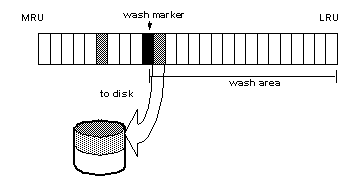If the wash area in a pool is too large, the buffers move too quickly past the wash marker in cache, and an asynchronous write is started on any dirty buffers, as shown in Figure 4-4. The buffer is marked clean and remains in the wash area of the MRU/LRU chain until it reaches the LRU. If another query changes a page in the buffer, Adaptive Server must perform additional I/O to write the buffer to disk again.
If sp_sysmon output shows a high percentage of buffers “Found in Wash” for a strict replacement policy cache, and there are no problems with dirty buffer grabs, try reducing the size of the wash area. See the Performance and Tuning Series: Monitoring Adaptive Server with sp_sysmon.
Figure 4-4: Effects of making the wash area too large
